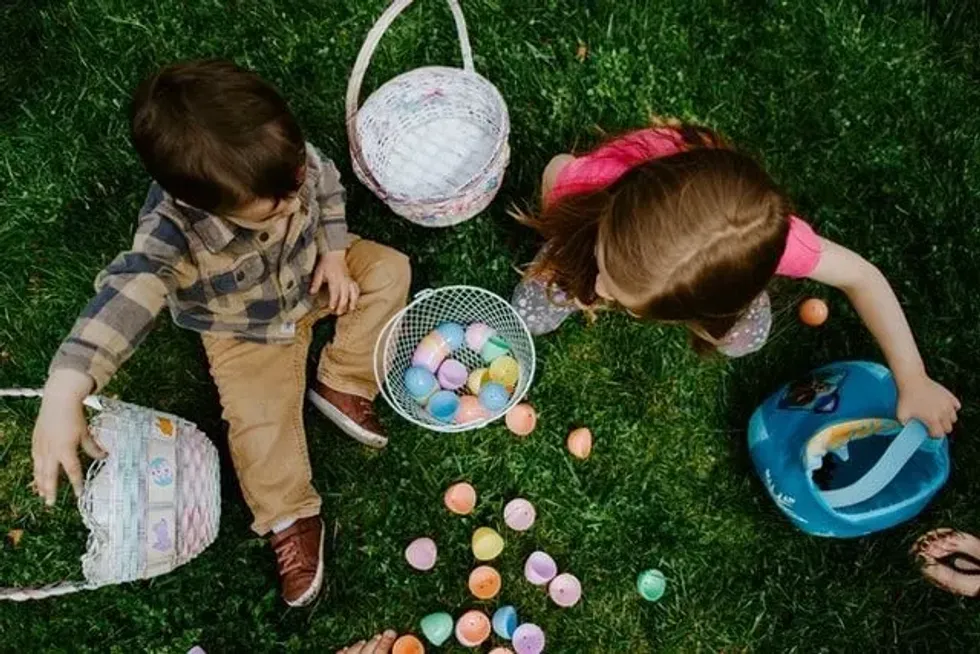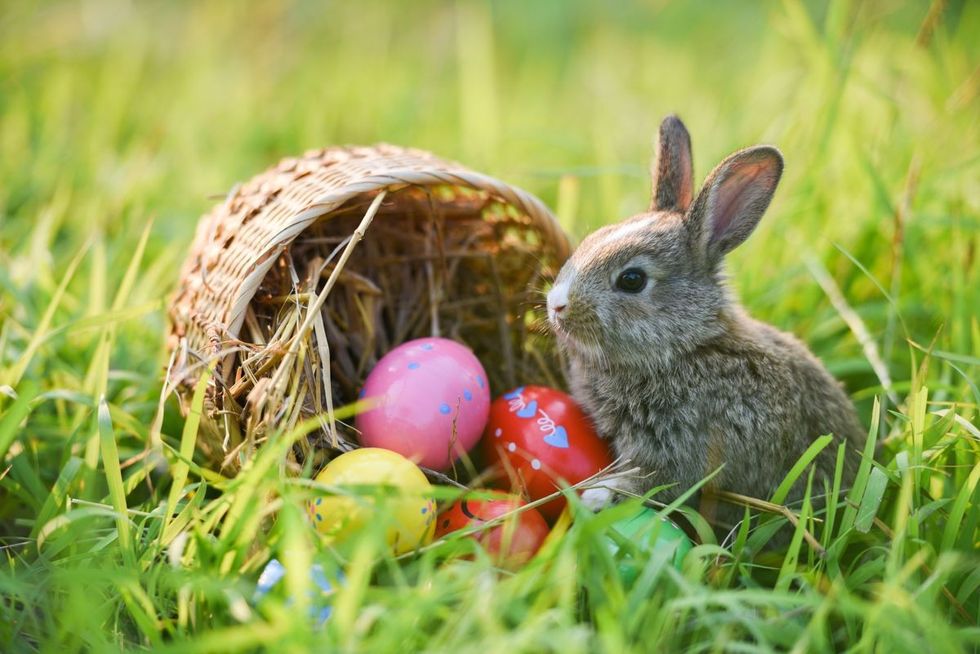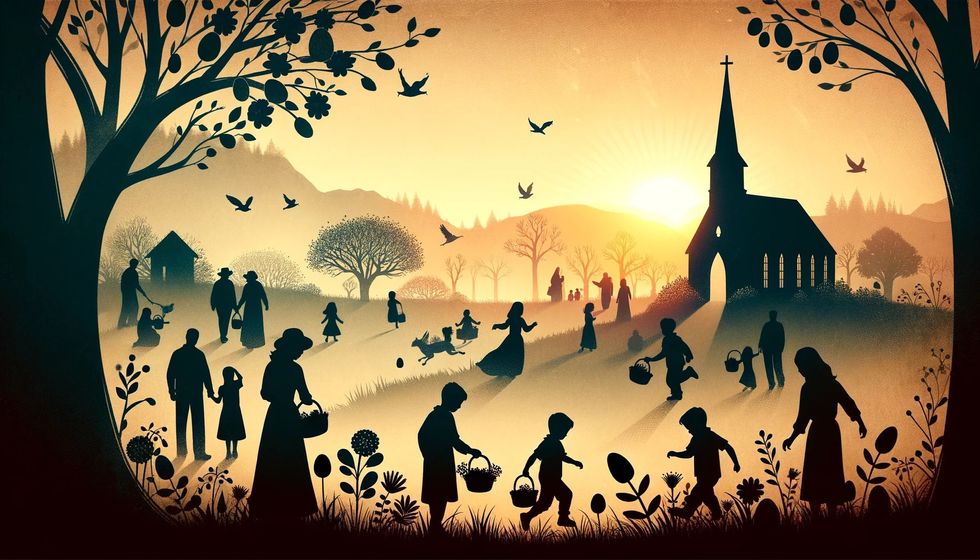March 31, 2024
Location: Worldwide
Easter Sunday is a special day full of faith and fun, marked by bright colors and happiness. For many Christians, it's very important because it celebrates the resurrection of Jesus Christ. It's a time when church bells ring loudly, bringing messages of hope and new beginnings.
Easter isn't only about religious celebrations; it's also a time of spring joy that welcomes everyone. There are Easter eggs hidden in gardens and the Easter Bunny visiting, mixing seriousness with celebration and bringing people together everywhere.
Learn about the Easter story, from the quiet events of Holy Week leading to Easter Day, to the lively celebration of Easter Monday. Take part in the traditions, from the thoughtful acts of Maundy Thursday to the happy shouts of 'hallelujah' at Easter mass.
Where is Easter Sunday celebrated?
Easter Sunday is a day Christians all over the world celebrate, especially in places where there are a lot of Christians. This includes the United States, Canada, Mexico, most of Europe, Australia, New Zealand, the Philippines, and many countries in South America and Africa.
Who is Easter Sunday celebrated by?
Christians of various denominations celebrate Easter Sunday, with the Roman Catholic Church being one of its most prominent observers. Yet, many non-Christians also enjoy the cultural aspects like Easter egg hunts.
When did Easter Sunday first start?
The beginnings of Easter Sunday are not precisely known, as the holiday has changed over the years, blending different customs. Yet, the core reason for the celebration, the resurrection of Jesus, has been marked by Christians since the religion's earliest period, going back to the first century CE. The earliest documented observation of Easter was in the second century.
Who started Easter Sunday?
Easter Sunday wasn't started by just one person but came from the early Christian church's traditions. The specific date for Easter was set by the Council of Nicaea in 325 CE. They decided Easter should be on the first Sunday after the first full moon following the spring equinox.
History And Timeline

ShutterstockTimeline Item 1
Date: Second Century
Heading: Early Observance Of Easter
Summary: The first documented celebration of Easter traces back to the second century, though the commemoration of Jesus’ Resurrection likely started earlier. This event signifies the inception of Easter as a major festival within the Christian church.
Timeline Item 2
Date: 325 CE
Heading: Council Of Nicaea And Easter Date Fixation
Summary: The Council of Nicaea in 325 CE decided that Easter would be celebrated on the first Sunday after the first full moon following the spring equinox. This was done to make sure all Christians celebrated Easter on the same day, solving disagreements about when it should be observed.
Timeline Item 3
Date: Seventh To Eighth Century
Heading: Bede And The Name 'Easter'
Summary: In the eighth century, The Venerable Bede proposed that the term 'Easter' originated from Eostre or Eostrae, the Anglo-Saxon spring and fertility goddess. This suggestion shows the blending of Christian and pagan customs.
Timeline Item 4
Date: 1732
Heading: First Recorded Sunrise Service
Summary: The first Easter sunrise service recorded happened in 1732 in Germany, held by the Moravian Church. This tradition represents finding Jesus' tomb empty at dawn and has become common across many Christian groups.
Timeline Item 5
Date: 19th Century
Heading: Commercialization And Popularization Of Easter
Summary: In the 19th century, Easter started to become more commercial and popular in Europe and America. This was when Easter cards, the Easter bunny, and chocolate eggs were introduced, mixing religious celebrations with popular culture.
Timeline Item 6
Date: 21st Century
Heading: Global And Diverse Celebrations
Summary: In the 21st century, Easter is celebrated all around the world, showing a mix of its Christian importance, cultural habits, and commercial aspects. The holiday includes everything from church services and marches to egg hunts and family dinners, showing how it has changed over time.
Traditions And Customs

ShutterstockEaster traditions vary widely across different cultures. In the West, the arrival of spring marks the beginning of Lent, a period of fasting that leads to Maundy Thursday, where the Last Supper is remembered. This is followed by the quiet reflection of Good Friday and the happy celebrations of Easter Sunday.
Eastern Orthodox churches share many of these customs but use the Julian calendar, so they often celebrate Easter on different dates.
Despite these differences, central symbols like the Passover lamb, unleavened bread, and the name 'Easter' itself, which comes from a German word meaning dawn and new life, all highlight the core message of Easter: the resurrection and the hope of eternal life.
Ways To Observe Or Celebrate Easter Sunday
Join in on local Easter egg hunts, get creative with decorating Easter eggs, and share special meals with those you care about to celebrate. Take part in Easter mass or services to think about the story of the resurrection and what it means for hope and spiritual fresh starts.
Also, get involved in community activities that give back during Easter week, showing support for the themes of new beginnings and change.
Easter Sunday Facts And Stats

- Easter does not have a fixed date but follows a lunar month pattern based on the astronomical full moon and the solar calendar, creating a range between March 22 and April 25.
- Many churches around the globe observe a non-working day or public holiday for Easter Monday, extending the weekend's celebration.
- The term 'Pascha', often used in place of Easter, connects back to the Jewish Passover feast and highlights the interconnected histories of Jewish and Christian communities.
- The Sunday that comes before Easter is called Palm Sunday. It marks the occasion when Jesus entered Jerusalem.
- The Easter Bunny tradition began with German Lutherans, who introduced it to the United States in the '00s.
- In the UK, hot cross buns are a traditional Easter treat. These buns have a cross on top, representing the crucifixion.
- The Easter Vigil is the oldest tradition linked to Easter, practiced since the early days of Christianity.
- In 2011, Belgium made the world's largest Easter egg. It was really heavy, weighing 8,268 lb (3,750 kg) and it was very big around, measuring 64.7 ft (1972 cm).
- The first documented White House Easter Egg Roll happened in 1878, while Rutherford B. Hayes was president.
- Since 1878, the White House Easter Egg Roll has been a fun tradition. In this event, kids use a spoon with a long handle to roll eggs across the grass.
- In Greece, a tradition is to enjoy Easter bread known as 'Tsoureki' during Easter. This bread is sweet, similar to brioche, and has a delicious orange and anise flavor.
- In 2011, Italy created the tallest chocolate Easter egg. It was tall, standing at 34.05 ft (1,038 cm), and very heavy, weighing 15,873 lb (7,200 kg).
Easter Sunday FAQs
What does Easter Sunday mean?
Easter Sunday represents fresh starts, everlasting life, and God's promise to people being fulfilled. For many Christians, it shows being saved from sin and death, shown by Jesus' resurrection.
It's a time to remember love, sacrifice, and the strong power of faith. The day is filled with happy celebrations, thankfulness, and thinking deeply about how Jesus' triumph over death affects them.
Why is Easter Sunday celebrated?
Easter Sunday celebrates Jesus' resurrection, an event many Christians see as the most important part of their faith. It's a day that brings hope of life after death and supports the promise of eternal life.
What happens on Easter Sunday morning?
On Easter Sunday, the day starts early for many Christians with sunrise services. These services celebrate the moment the empty tomb was found and Jesus' resurrection. Churches host special Easter services or masses, which are usually the most crowded of the year.
These services are full of music, candlelight, bright decorations, and stories about Easter. It's also a time when families and friends come together to eat, children take part in Easter egg hunts, and people give Easter cards and gifts to spread happiness and blessings.
How do the Easter Bunny and Easter eggs relate to the holiday?
Easter Bunny and Easter eggs are symbols of new life and fertility that blend with Christian traditions of resurrection, adopted from pagan celebrations of spring.
What is unique about Easter celebrations?
Easter uniquely merges solemn religious observance with a warm, family-oriented celebration of renewal and joy, reflected in both church services and communal activities.
Follow On Social Media
Join the celebration using these popular hashtags:
Twitter Hashtag: #EasterSunday #ResurrectionSunday#EasterSunday #ResurrectionSunday #EasterJoy #HeHasRisen #EasterEggs #EasterBunny #HolyWeek #EasterService #NewLife #EasterBlessings
Instagram Hashtag: #EasterCelebration #HeIsRisen #EasterMorning #EasterMass #EasterTraditions #EasterWeekend #EasterPrayers #SpringRenewal #EasterSundayFun #EasterWithFamily
When is this day celebrated?
04/20/2025, Sunday
04/05/2026, Sunday
03/28/2027, Sunday
04/16/2028, Sunday
Easter Sunday is a special day that combines old stories of faith with today's fun celebrations. It's a time when people feel hope and look forward to new beginnings, just like the start of spring. Families and friends come together to do lots of different things, from serious candlelight gatherings to fun Easter egg hunts.
This day is about a very old story of overcoming tough times with hope and joy. It tells people that good things can come after bad ones. Easter invites everyone, whether they follow the faith or not, to think about life's ups and downs, enjoy being with others, and get into the spirit of this happy season.
Related Articles Around the Web











